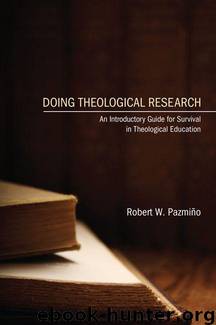Doing Theological Research: An Introductory Guide for Survival in Theological Education by Robert W. Pazmino

Author:Robert W. Pazmino
Language: eng
Format: azw3
ISBN: 9781606089392
Publisher: Wipf & Stock, an imprint of Wipf and Stock Publishers
Published: 2009-09-01T04:00:00+00:00
7
Practical Advice
THEOLOGICAL EDUCATION while focusing on theology is itself a form of education. Education in general can be defined as a process that shares content with persons in the context of their community and society. In the case of theological education that content is the study of theos or God. Education in general attends to the three elements of content, persons, and context that the prior six chapters have explored for the particular case of theological education. But as my definition for education suggests, theological education is also a process that can assist persons to navigate through their experiences in a theological school. What practical advice can help guide the process of theological education?
Theological students can first note that the content of theological education engages their head, heart, and hands. The head is engaged through the academic and intellectual challenge of exploring questions and problems while studying God and life in God’s creation. The heart is engaged in first writing with one’s heart as discussed in chapter 5 and embracing spiritual practices as noted in chapter 6. The hands are engaged in doing the reading, research, and writing noted throughout this guide. The hands are also engaged by living in community with others in a theological school and through service both within and beyond the setting of a theological community in various ministry settings. This final chapter provides some practical advice for one’s hands in doing theological research. While engaging their hands, theological students are nurturing their hearts and heads in what hopefully is a holistic experience that enables them to theologically reflect, spiritually imagine, and transformatively practice their faith. I identify practical suggestions to facilitate the process of theological education for all those called to this joyful venture.
START EARLY
To allow for a process rather than a last minute crunch it is crucial to allot sufficient time for the research phases of theological inquiry prior to actual writing. In order to write with both heart and head, time is also crucial between those two phases of expressing one’s thoughts in a coherent and intelligible fashion in graduate study. If one’s professor is to be consulted and peers provided an opportunity to read one’s work for comments and suggestions, time must be factored into one’s plans. All this suggests the need to start early and perhaps begin planning as soon as one’s assignments for a semester or term are given. As noted earlier working back from the due date of an assignment can assist in outlining reasonable benchmarks to guide efforts and enable a successful completion of work.
ASK FOR HELP
If theological education is to foster a communal experience where “iron sharpens iron,” students are to be open to ask for help from their instructors and peers. Christian faith affirms a corporate identity as children of God, the body of Christ, and the temple of the Holy Spirit. In the context of a theological school, one expression of that spiritual reality is fostered when students request and receive support for their theological research.
Download
This site does not store any files on its server. We only index and link to content provided by other sites. Please contact the content providers to delete copyright contents if any and email us, we'll remove relevant links or contents immediately.
The Lost Art of Listening by Michael P. Nichols(7492)
Why I Am Not A Calvinist by Dr. Peter S. Ruckman(4148)
The Rosicrucians by Christopher McIntosh(3510)
Wicca: a guide for the solitary practitioner by Scott Cunningham(3167)
Signature in the Cell: DNA and the Evidence for Intelligent Design by Stephen C. Meyer(3128)
Real Sex by Lauren F. Winner(3014)
The Holy Spirit by Billy Graham(2944)
To Light a Sacred Flame by Silver RavenWolf(2814)
The End of Faith by Sam Harris(2733)
The Gnostic Gospels by Pagels Elaine(2527)
Waking Up by Sam Harris(2454)
Nine Parts of Desire by Geraldine Brooks(2359)
Jesus by Paul Johnson(2352)
Devil, The by Almond Philip C(2324)
The God delusion by Richard Dawkins(2305)
Heavens on Earth by Michael Shermer(2278)
Kundalini by Gopi Krishna(2180)
Chosen by God by R. C. Sproul(2161)
The Nature of Consciousness by Rupert Spira(2103)
